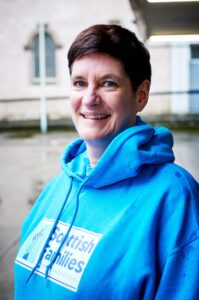 2024 marks a special year for Adfam as we celebrate our 40th year. Over the course of 2024 we are releasing a series of monthly articles, reflecting on Adfam’s forty years, where things have improved for families, and where we still have progress to make. Along the way we’ll be speaking to a range of key people that have been active in supporting families affected by substance misuse throughout those years.
2024 marks a special year for Adfam as we celebrate our 40th year. Over the course of 2024 we are releasing a series of monthly articles, reflecting on Adfam’s forty years, where things have improved for families, and where we still have progress to make. Along the way we’ll be speaking to a range of key people that have been active in supporting families affected by substance misuse throughout those years.
For our fourth Adfam at 40 article we speak with Justina Murray, Chief Executive of Scottish Families Affected by Alcohol and Drugs.
Supporting families affected by substance use in Scotland
Justina has been at the helm of Scottish Families for seven years, and the charity has made incredible strides over that time. However, it was somewhat by accident that Justina first landed in the role. Having been made redundant at her previous organisation, she came across the role through recruitment consultants, and having previously worked in community justice, was struck by the number of parallels in the issues families affected by substance use face.
Seven years on, Justina is so glad she decided to move to Scottish Families. Not a day goes by that she doesn’t appreciate the rewarding nature of the work, the amazing, passionate team she works with, and the families they support who are incredible.
Scottish Families support anyone in Scotland concerned about someone else’s drug or alcohol use. They have a range of both national and local services that reach families across all of Scotland’s local authority areas, working with families from urban, rural and island communities, across all social groupings. Whilst the support Scottish Families provide is mostly for adult family members 16+, they do also have their Routes young persons project for 12-26-year-olds in East and West Dunbartonshire, now expanding across Scotland through the Grow Your Own Routes programme.

Scottish Families’ support includes a national helpline, national bereavement support, 1:1 Telehealth support, along with five local family support services in different areas of Scotland. In addition to Routes, they have a range of other national programmes, including ‘My Family My Rights’, ‘Connecting Families’ and Befriending & Volunteering, along with active policy and research, learning and development, communications, and fundraising functions. There is always lots going on, with just over 40 staff working across their local and national services. Similarly to Adfam, Scottish Families was set up by families themselves and proudly hold on to that important grassroots history, ensuring families are involved in every aspect of their work.
Similarities and differences in the family experience in Scotland
‘Same but different’ Justina replies when asked what the differences are for families affected by substance use in Scotland. Politically, things are very different. The Scottish National Party (SNP) have led the Scottish Parliament since 2007 (including periods of minority government), and alcohol policy in Scotland has been significantly more forward-thinking than in England. Scotland introduced Minimum Unit Pricing (MUP) in 2018, and whilst it sometimes feels things aren’t moving forward as quickly as they should, there are plans to do more around alcohol marketing, availability and treatment services. In terms of drug policy, this sits firmly within the health directorate of the Scottish government and crucially is seen as a public health, not a criminal justice issue.

Creator: Andrew Cowan | Credit: Andrew Cowan/Scottish Parliament
Copyright: Image © Scottish Parliamentary Corporate Body – 2017
In terms of what’s the same, the experiences of families are very much the same in Scotland as they are in the rest of the UK. Justina comments on how they share many of the same frustrations around the lack of support for families, the length of time it takes families to access support, and the invisibility of families and how they are silenced, ignored and judged.
Justina also highlights the link between poverty, deprivation and substance use, although in her experience whilst it is the case that the harm may be greater where there’s poverty and deprivation, drug and alcohol-related harm happens right across all families and communities. In Scotland, the issue is particularly prevalent, and you would be hard-pressed to find someone in your family, work or social networks that’s not been harmed by their own or someone else’s drug or alcohol use. Scottish Families support families in every single one of Scotland’s 32 local authorities – urban, rural and island, and from all social groupings.
Looking back as well as ahead
There’s lots for Justina to be proud of at Scottish Families. Last year they reached their own 20-year anniversary, a fantastic achievement but also an opportunity to look back and reflect on how far they have come, growing from a tiny organisation to now reaching across all of Scotland. There has been a particularly rapid growth since Justina joined in 2017, expanding from around 10 members of staff then to now over 40. Despite the growth, keeping on keeping on is also a key and understated achievement. Running a charity is getting harder and harder, and being seen and heard, and making sure there are enough funds to keep going, is paramount.
One key achievement Justina points to which she is particularly proud of, is how Scottish Families responded during the COVID-19 pandemic. Throughout the various lockdowns, Scottish Families did not miss a second. Where other services shut their doors, they kept on delivering right the way through, being creative, adaptable and flexible, introducing lots of new ways of reaching families and new services. The feedback they receive from families about their support, described by many as ‘life-changing’ and ‘life-saving’, is a testament to her team and vital work they do.

Reflecting on where to go next, rather than expanding the charity further, it was felt that Scottish Families should instead utilise their own expertise to support others to develop good family support, whilst maintaining and strengthening their own services. Rather than trying to open a local service in every bit of Scotland, there is more to be gained from identifying other local providers who might already provide some family support, or could develop family support, and making sure they are using evidence-based interventions and are well networked and supported within the sector.
Looking ahead, Justina notes that from a policy perspective family support is actually in a good place in Scotland, on paper. All the written policy commitments about the support that all families should receive, are there. However, making sure the reality matches what is written down in policy is a different matter, and the reality is that families often still miss out on the support they need. This needs to change.
Furthermore, stigma, and the shame and secrecy that comes with it, continues to be a stumbling block for families and gets in the way of people reaching support. We need to see people talking more openly about what’s going on and normalising these issues in a positive way.
In one final reflection, Justina points to the Scottish Families’ ‘Ask the Family’ project, where they asked family members when they were first harmed by substance use, and how long it took them to reach family support for the first time. On average, they said they were harmed by substance use for sixteen years, but it took them eight years on average to reach family support. They also asked them to think about all the people who were harmed by that substance use, to indicate the different categories of people and to count how many people overall. Every family relationship and social network was selected, and on average people identified eleven people harmed for each person using substances. If you think of the millions and millions of pounds that goes into supporting individuals using alcohol or drugs or in recovery, just imagine if you were to multiply that by eleven for families and others affected! Of course that’s not the reality, but it does demonstrate the need for a change in approach in better recognising and prioritising families.
Justina concludes by articulating how far family support has come:
“Many people view family support as being a ‘little bit fluffy’, and just means families having a cup of tea and having a chat, and whilst it’s important for families to connect with each other, also important is thinking about how families can change their lives with the right support. Programmes such as CRAFT, 5-step and SMART all support families to make that change regardless of what happens with their loved ones. That is something that is often overlooked, often the focus is on the person using substances and them changing, but that there are lots of things family members can do to have a better life for themselves and to recover as a family. That is the key message that we need to get out there.”
For more information about Scottish Families Affected by Alcohol and Drugs and the support they provide to families in Scotland visit sfad.org.uk.

